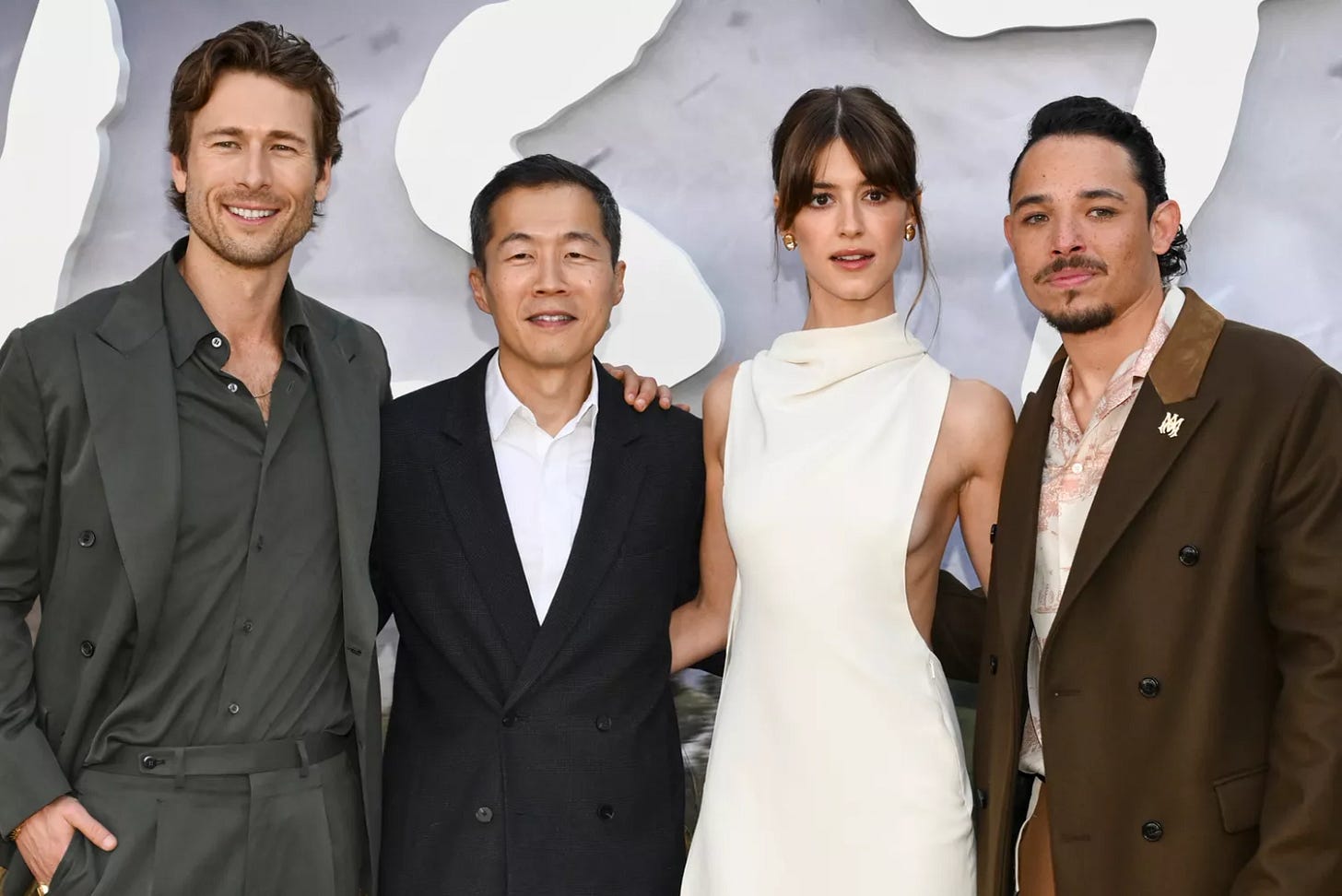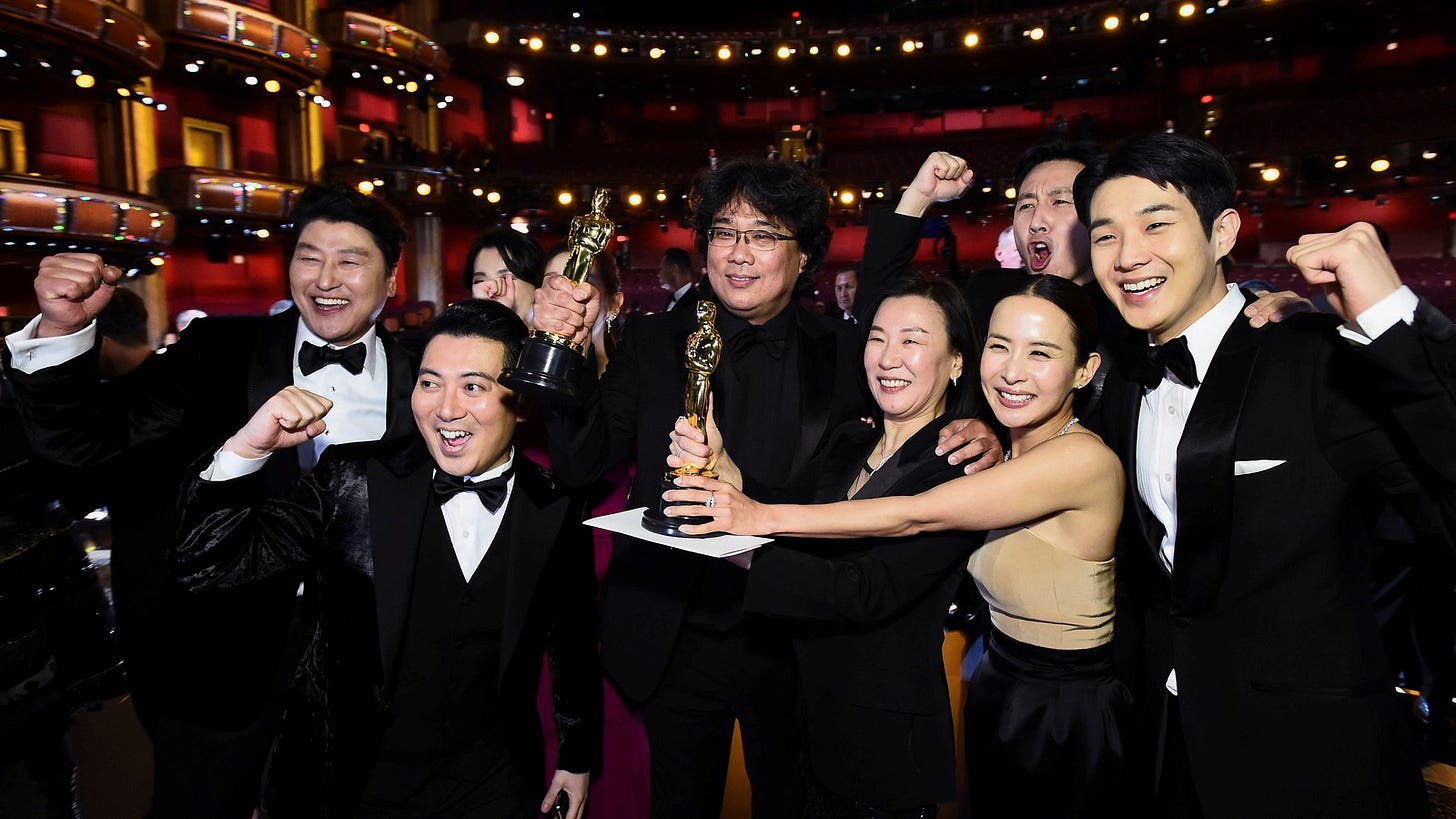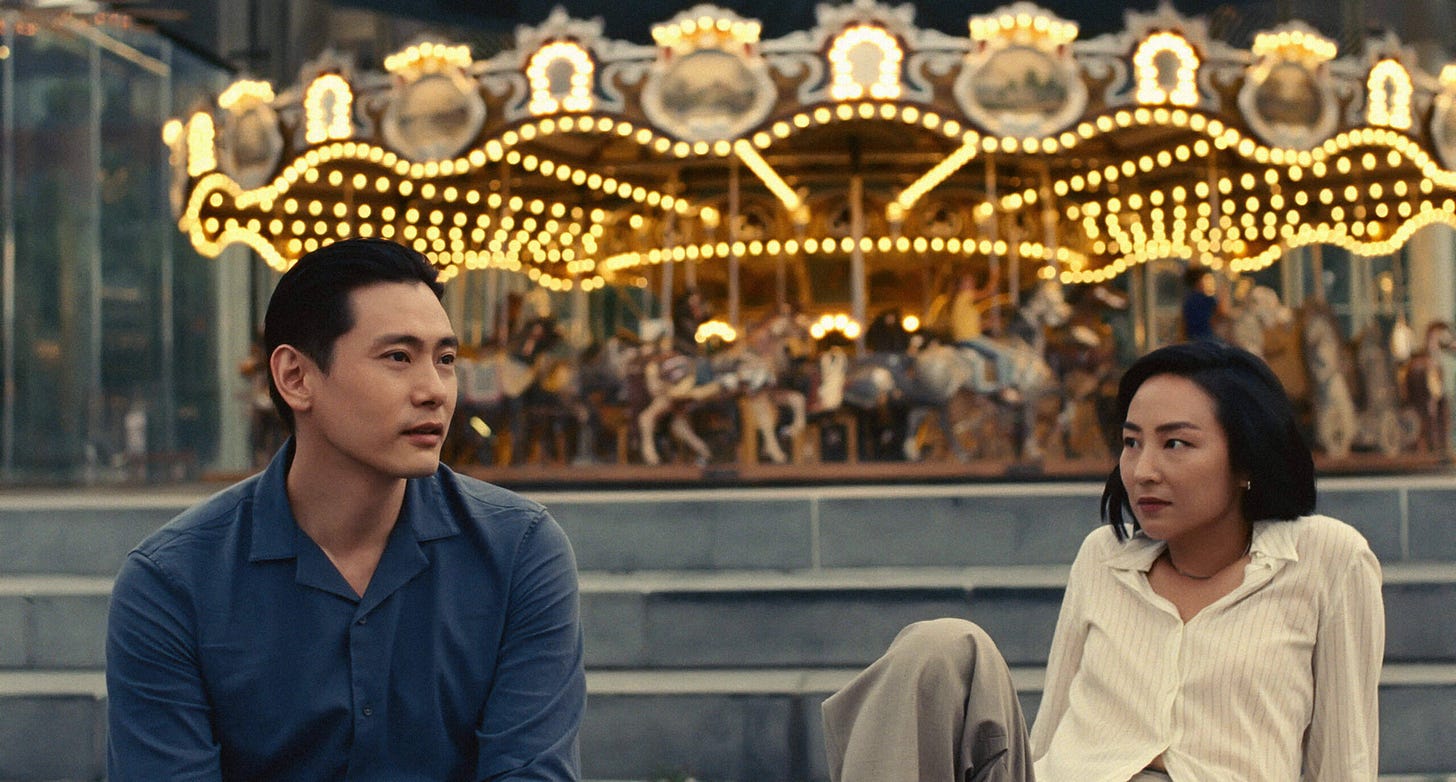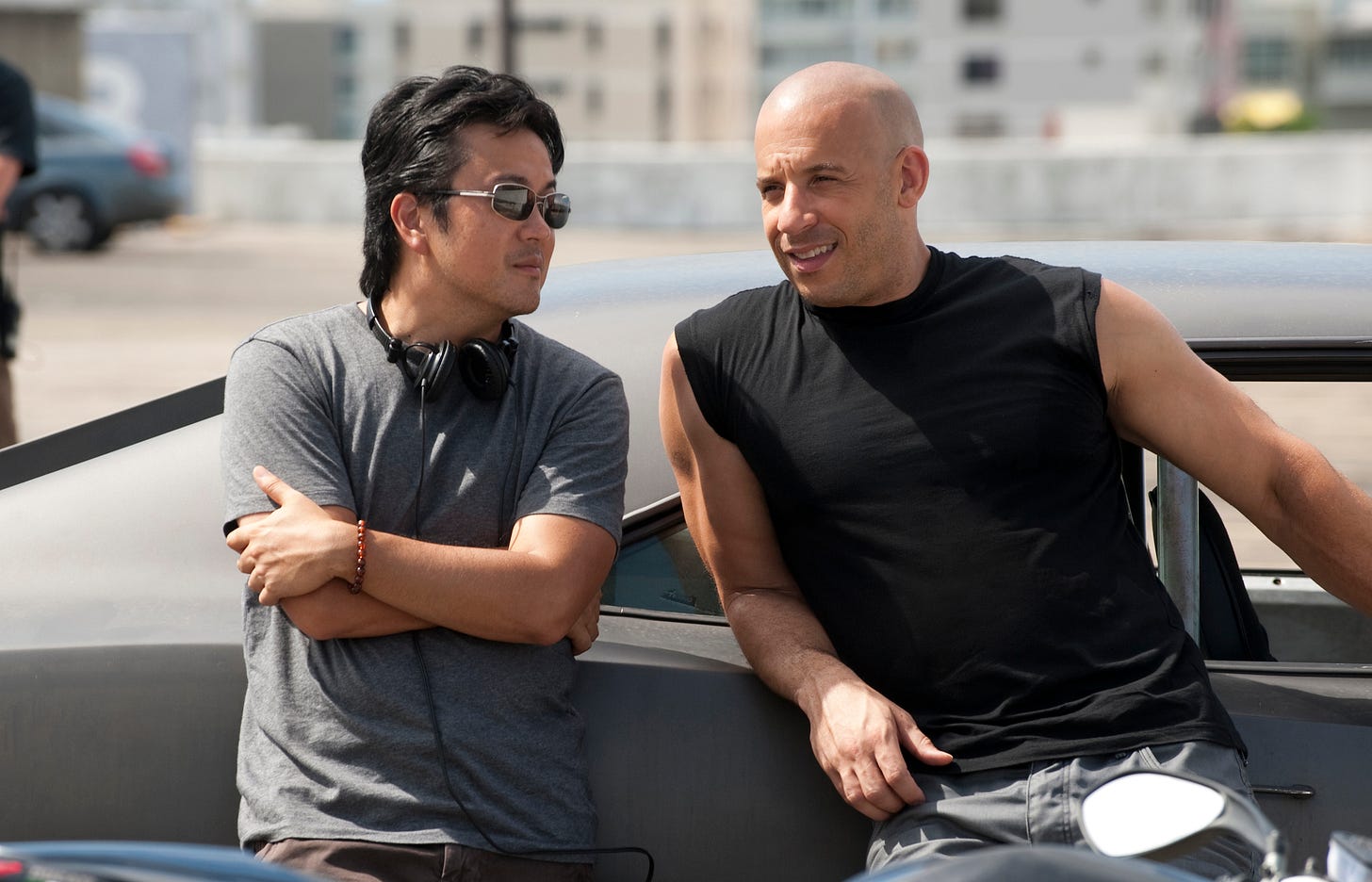Do Asian American Directors Need to Tell "Asian American" Stories?
Assorted thoughts on representation in today's Hollywood

Back in August, I went to see Twisters with a group of friends from work. I enjoyed the film, with all its natural disaster spectacle enhanced by the 4DX format we’d chosen. But when the credits rolled, I found myself transfixed by one line of text: “Directed by Lee Isaac Chung.” This, I realized, was Chung’s follow-up to Minari, the sensitive semi-autobiographical family drama that had won him several Academy Award nominations in 2021. The sheer fact that an Asian American director was following up a deeply Asian American story with a mainstream (white-led) blockbuster made me pause, reflect on what may be a growing trend, and wonder if Twisters was truly the best use of Chung’s talents.
In the last few years, Asian representation at the upper echelons of Hollywood has had a moment. In 2018, Jon M. Chu’s Singapore-set rom-com Crazy Rich Asians and Aneesh Chaganty’s John Cho-led thriller Searching topped the box office in the same month, leading media to coin the phrase “Asian August.” The following year, Lulu Wang’s sensitive family drama The Farewell garnered critical acclaim, awards buzz, and a Golden Globe for star Awkwafina.
While not an American film in any sense, the juggernaut success of the Korean black comedy Parasite at that year’s Oscars also heavily contributed to the overall feeling that the tide of Asian artists in the US mainstream was rising.
Though the COVID pandemic overshadowed the year for cinema in 2020, Asian Americans once again helmed some of the year’s buzziest films. Chung’s Minari, a family story inspired by his coming of age in a family of Korean immigrants in rural Arkansas, won Youn Yuh-jung an Oscar for Best Supporting Actress, and that year’s Best Picture winner, Nomadland, though not centered on Asian characters, was directed by the Chinese-born filmmaker Chloé Zhao.
One of last year’s most acclaimed Asian American stories wasn’t a film but a streaming series. Lee Sung Jin’s Beef paired Steven Yeun and Ali Wong in a gripping dark comedy that mined some of the dark psychological underbelly of much of Asian America. (I wrote a more in-depth piece about Beef’s groundbreaking sensibility shortly after its release.)
Just last year, the Korean American director Celine Song captured critical acclaim and Oscar buzz for her semi-autobiographical romantic drama Past Lives, in which a Korean immigrant finds herself caught in a love triangle that forces her to choose between her American life and nostalgia for her Korean upbringing.
With an exciting new cohort of Asian American filmmakers garnering hype in Hollywood, it might seem natural to assume they’d be at the helm of a new rise of Asian American cinema, bringing more stories centering their underrepresented demographic to the big screen. Yet a slightly odd pattern seems to be beginning to emerge: these directors are, by and large, going on to projects with non-Asian leads.
As I mentioned at the top of this piece, Chung’s follow-up to Minari was Twisters, led by Daisy Edgar-Jones, Glen Powell, and Anthony Ramos. Whereas Minari subverted expectations around the iconography of the American West, showcasing Asian immigrants as farmers pursuing their American Dream, Edgar-Jones and Powell as the central couple in Twisters stand as the sort of classically good-looking, sandy-haired white people media has long associated with the region. Though the film’s supporting cast is otherwise fairly diverse, the only Asian character is a minor role played by Brandon Perea, who is of Filipino and Puerto Rican descent, as a friend of Powell’s character.
Song, meanwhile, recently finished filming her next movie, the rom-com Materialists. Where Past Lives provided a showcase and breakthrough moment for actors Greta Lee and Teo Yoo, Materialists pairs two established white stars: Chris Evans and Dakota Johnson.
Lee is also keeping busy. He’s working on a second season of Beef, which is continuing with a new cast, rather than force the characters played by Yeun and Wong into a new story. Though details remain scarce, it’s been reported that the second season will star Oscar Isaac, Carey Mulligan, Charles Melton, and Cailee Spaeny. If true, this would mean a shift from a fully Asian American-led show to one where only one of the four leads (Melton) is of Asian descent.
Lee is also working on Thunderbolts, having cowritten the screenplay for the upcoming Marvel team-up flick which stars Sebastian Stan and Florence Pugh. That film has no Asian members in its titular team of anti-heroes, and the only person of Asian background on the cast list is Geraldine Viswanathan, playing an assistant to the CIA director, played by Julia Louis-Dreyfus. Notably, Thunderbolts was set to feature Yeun in a major role as the superhero Sentry, but he dropped out and was replaced by Lewis Pullman, a move that indicates that the character was not necessarily written as Asian.
While a Crazy Rich Asians sequel may finally, over six years later, be getting off the ground, Chu has also moved on to other non-Asian led projects, having become one of contemporary Hollywood’s foremost directors of big-scale splendor, helming two adaptations of beloved Broadway musicals: 2021’s In the Heights and the upcoming Wicked.
Indeed, looking into the recent past of Asian American cinema, career trajectories like this aren’t a new phenomenon. 1993’s The Joy Luck Club, an adaptation of the acclaimed Amy Tan novel, was reportedly only the second-ever major studio Hollywood film centered on Asian Americans, after 1961’s Flower Drum Song. Yet its success didn’t result in a new wave of Asian American stories. Instead, director Wayne Wang became perhaps best known for his subsequent rom-coms like Maid in Manhattan, starring Jennifer Lopez, and Last Holiday, starring Queen Latifah. While in recent years, Wang has returned to Asian-focused projects, it seems his time in the Hollywood limelight has, for now, passed.
Another example might be found in the career of Justin Lin. His debut solo feature, 2002’s Better Luck Tomorrow, is an acid coming-of-age crime dramedy that serves as a look into the dark neuroses of many Asian Americans with a sharp insight that I’ve scarcely seen in other media beyond Beef. But in the years since, he too has found success in non-Asian led blockbuster franchises, including becoming arguably the primary architect of the Fast and Furious series.
While I obviously have no insight into the future of Hollywood, I worry we’re at the precipice of another post-Joy Luck Club moment, one where a foretold rising tide of Asian American cinema fails to materialize, its constituent talent subsumed into the white-led mainstream.
I have no real prescription of what ought to be done in this case. Obviously, Asian American artists, like artists of any demographic, should not be restricted to only telling the stories of “their community.” Talented filmmakers often draw from their own experiences, but just as often, they use their talents to craft characters wholly different from themselves.
More often than not, though, it seems like if Asian American directors don’t take charge of telling Asian American stories, they won’t get told at all. Additionally, from an outsider’s perspective, it’s difficult to tell if this pivot from Asian creators towards non-Asian-led projects is out of genuine creative desire on their part, or a more business-minded decision because those are the only projects for which they can secure backing. If directors like Chung and Song are making the films they want, more power to them. But if exciting talents like these aren’t able to get Asian-led projects greenlit, it’s a shame for the industry.
This apparent pattern also raises worries that industry gatekeepers may think that Asian American protagonists only work in semi-autobiographical dramas— like The Farewell, Minari, Past Lives, or this year’s Dìdi— and not as the leads in more mainstream fare aimed at a wider audience. This is not a disparagement of these films, all accomplished works of cinematic storytelling that landed among my favorites of their respective years. Stories focused on Asian American culture, identity, and belonging are important and vital. But they are not the only stories our community can tell. There’s no compelling reason, for example, that one of the leads of Twisters couldn’t have been Asian. The only relevant cultural background for those characters is the region of the United States they live in.
For much of the last decade, it’s felt like a wave of Asian American media was just on the verge of breaking. But rather than a wave, we’ve had a slow trickle. New creators break through, tell their own story, then, whether by their own volition, industry pressures, or a combination of all of the above, apparently retreat from Asian-centric projects. There’s no person or force to blame here, it’s just a bitter reminder of the small-c conservatism undergirding what gets made in an often superficially progressive film world. We can only hope that the future of cinema might be one in which Asian American stories, in all their nuance and variety, might have a place onscreen.







